
ray
Ray is an AI compute engine. Ray consists of a core distributed runtime and a set of AI Libraries for accelerating ML workloads.
Stars: 41459

Ray is a unified framework for scaling AI and Python applications. It consists of a core distributed runtime and a set of AI libraries for simplifying ML compute, including Data, Train, Tune, RLlib, and Serve. Ray runs on any machine, cluster, cloud provider, and Kubernetes, and features a growing ecosystem of community integrations. With Ray, you can seamlessly scale the same code from a laptop to a cluster, making it easy to meet the compute-intensive demands of modern ML workloads.
README:
.. image:: https://github.com/ray-project/ray/raw/master/doc/source/images/ray_header_logo.png
.. image:: https://readthedocs.org/projects/ray/badge/?version=master :target: http://docs.ray.io/en/master/?badge=master
.. image:: https://img.shields.io/badge/Ray-Join%20Slack-blue :target: https://www.ray.io/join-slack
.. image:: https://img.shields.io/badge/Discuss-Ask%20Questions-blue :target: https://discuss.ray.io/
.. image:: https://img.shields.io/twitter/follow/raydistributed.svg?style=social&logo=twitter :target: https://x.com/raydistributed
.. image:: https://img.shields.io/badge/Get_started_for_free-3C8AE9?logo=data%3Aimage%2Fpng%3Bbase64%2CiVBORw0KGgoAAAANSUhEUgAAABAAAAAQCAYAAAAf8%2F9hAAAAAXNSR0IArs4c6QAAAERlWElmTU0AKgAAAAgAAYdpAAQAAAABAAAAGgAAAAAAA6ABAAMAAAABAAEAAKACAAQAAAABAAAAEKADAAQAAAABAAAAEAAAAAA0VXHyAAABKElEQVQ4Ea2TvWoCQRRGnWCVWChIIlikC9hpJdikSbGgaONbpAoY8gKBdAGfwkfwKQypLQ1sEGyMYhN1Pd%2B6A8PqwBZeOHt%2FvsvMnd3ZXBRFPQjBZ9K6OY8ZxF%2B0IYw9PW3qz8aY6lk92bZ%2BVqSI3oC9T7%2FyCVnrF1ngj93us%2B540sf5BrCDfw9b6jJ5lx%2FyjtGKBBXc3cnqx0INN4ImbI%2Bl%2BPnI8zWfFEr4chLLrWHCp9OO9j19Kbc91HX0zzzBO8EbLK2Iv4ZvNO3is3h6jb%2BCwO0iL8AaWqB7ILPTxq3kDypqvBuYuwswqo6wgYJbT8XxBPZ8KS1TepkFdC79TAHHce%2F7LbVioi3wEfTpmeKtPRGEeoldSP%2FOeoEftpP4BRbgXrYZefsAI%2BP9JU7ImyEAAAAASUVORK5CYII%3D :target: https://www.anyscale.com/ray-on-anyscale?utm_source=github&utm_medium=ray_readme&utm_campaign=get_started_badge
Ray is a unified framework for scaling AI and Python applications. Ray consists of a core distributed runtime and a set of AI libraries for simplifying ML compute:
.. image:: https://github.com/ray-project/ray/raw/master/doc/source/images/what-is-ray-padded.svg
.. https://docs.google.com/drawings/d/1Pl8aCYOsZCo61cmp57c7Sja6HhIygGCvSZLi_AuBuqo/edit
Learn more about Ray AI Libraries_:
-
Data_: Scalable Datasets for ML -
Train_: Distributed Training -
Tune_: Scalable Hyperparameter Tuning -
RLlib_: Scalable Reinforcement Learning -
Serve_: Scalable and Programmable Serving
Or more about Ray Core_ and its key abstractions:
-
Tasks_: Stateless functions executed in the cluster. -
Actors_: Stateful worker processes created in the cluster. -
Objects_: Immutable values accessible across the cluster.
Learn more about Monitoring and Debugging:
- Monitor Ray apps and clusters with the
Ray Dashboard <https://docs.ray.io/en/latest/ray-core/ray-dashboard.html>__. - Debug Ray apps with the
Ray Distributed Debugger <https://docs.ray.io/en/latest/ray-observability/ray-distributed-debugger.html>__.
Ray runs on any machine, cluster, cloud provider, and Kubernetes, and features a growing
ecosystem of community integrations_.
Install Ray with: pip install ray. For nightly wheels, see the
Installation page <https://docs.ray.io/en/latest/ray-overview/installation.html>__.
.. _Serve: https://docs.ray.io/en/latest/serve/index.html
.. _Data: https://docs.ray.io/en/latest/data/dataset.html
.. _Workflow: https://docs.ray.io/en/latest/workflows/
.. _Train: https://docs.ray.io/en/latest/train/train.html
.. _Tune: https://docs.ray.io/en/latest/tune/index.html
.. _RLlib: https://docs.ray.io/en/latest/rllib/index.html
.. _ecosystem of community integrations: https://docs.ray.io/en/latest/ray-overview/ray-libraries.html
Today's ML workloads are increasingly compute-intensive. As convenient as they are, single-node development environments such as your laptop cannot scale to meet these demands.
Ray is a unified way to scale Python and AI applications from a laptop to a cluster.
With Ray, you can seamlessly scale the same code from a laptop to a cluster. Ray is designed to be general-purpose, meaning that it can performantly run any kind of workload. If your application is written in Python, you can scale it with Ray, no other infrastructure required.
-
Documentation_ -
Ray Architecture whitepaper_ -
Exoshuffle: large-scale data shuffle in Ray_ -
Ownership: a distributed futures system for fine-grained tasks_ -
RLlib paper_ -
Tune paper_
Older documents:
-
Ray paper_ -
Ray HotOS paper_ -
Ray Architecture v1 whitepaper_
.. _Ray AI Libraries: https://docs.ray.io/en/latest/ray-air/getting-started.html
.. _Ray Core: https://docs.ray.io/en/latest/ray-core/walkthrough.html
.. _Tasks: https://docs.ray.io/en/latest/ray-core/tasks.html
.. _Actors: https://docs.ray.io/en/latest/ray-core/actors.html
.. _Objects: https://docs.ray.io/en/latest/ray-core/objects.html
.. _Documentation: http://docs.ray.io/en/latest/index.html
.. _Ray Architecture v1 whitepaper: https://docs.google.com/document/d/1lAy0Owi-vPz2jEqBSaHNQcy2IBSDEHyXNOQZlGuj93c/preview
.. _Ray Architecture whitepaper: https://docs.google.com/document/d/1tBw9A4j62ruI5omIJbMxly-la5w4q_TjyJgJL_jN2fI/preview
.. _Exoshuffle: large-scale data shuffle in Ray: https://arxiv.org/abs/2203.05072
.. _Ownership: a distributed futures system for fine-grained tasks: https://www.usenix.org/system/files/nsdi21-wang.pdf
.. _Ray paper: https://arxiv.org/abs/1712.05889
.. _Ray HotOS paper: https://arxiv.org/abs/1703.03924
.. _RLlib paper: https://arxiv.org/abs/1712.09381
.. _Tune paper: https://arxiv.org/abs/1807.05118
.. list-table:: :widths: 25 50 25 25 :header-rows: 1
-
- Platform
- Purpose
- Estimated Response Time
- Support Level
-
-
Discourse Forum_ - For discussions about development and questions about usage.
- < 1 day
- Community
-
-
-
GitHub Issues_ - For reporting bugs and filing feature requests.
- < 2 days
- Ray OSS Team
-
-
-
Slack_ - For collaborating with other Ray users.
- < 2 days
- Community
-
-
-
StackOverflow_ - For asking questions about how to use Ray.
- 3-5 days
- Community
-
-
-
Meetup Group_ - For learning about Ray projects and best practices.
- Monthly
- Ray DevRel
-
-
-
Twitter_ - For staying up-to-date on new features.
- Daily
- Ray DevRel
-
.. _Discourse Forum: https://discuss.ray.io/
.. _GitHub Issues: https://github.com/ray-project/ray/issues
.. _StackOverflow: https://stackoverflow.com/questions/tagged/ray
.. _Meetup Group: https://www.meetup.com/Bay-Area-Ray-Meetup/
.. _Twitter: https://x.com/raydistributed
.. _Slack: https://www.ray.io/join-slack?utm_source=github&utm_medium=ray_readme&utm_campaign=getting_involved
For Tasks:
Click tags to check more tools for each tasksFor Jobs:
Alternative AI tools for ray
Similar Open Source Tools

ray
Ray is a unified framework for scaling AI and Python applications. It consists of a core distributed runtime and a set of AI libraries for simplifying ML compute, including Data, Train, Tune, RLlib, and Serve. Ray runs on any machine, cluster, cloud provider, and Kubernetes, and features a growing ecosystem of community integrations. With Ray, you can seamlessly scale the same code from a laptop to a cluster, making it easy to meet the compute-intensive demands of modern ML workloads.

deeppowers
Deeppowers is a powerful Python library for deep learning applications. It provides a wide range of tools and utilities to simplify the process of building and training deep neural networks. With Deeppowers, users can easily create complex neural network architectures, perform efficient training and optimization, and deploy models for various tasks. The library is designed to be user-friendly and flexible, making it suitable for both beginners and experienced deep learning practitioners.

lemonai
LemonAI is a versatile machine learning library designed to simplify the process of building and deploying AI models. It provides a wide range of tools and algorithms for data preprocessing, model training, and evaluation. With LemonAI, users can easily experiment with different machine learning techniques and optimize their models for various tasks. The library is well-documented and beginner-friendly, making it suitable for both novice and experienced data scientists. LemonAI aims to streamline the development of AI applications and empower users to create innovative solutions using state-of-the-art machine learning methods.
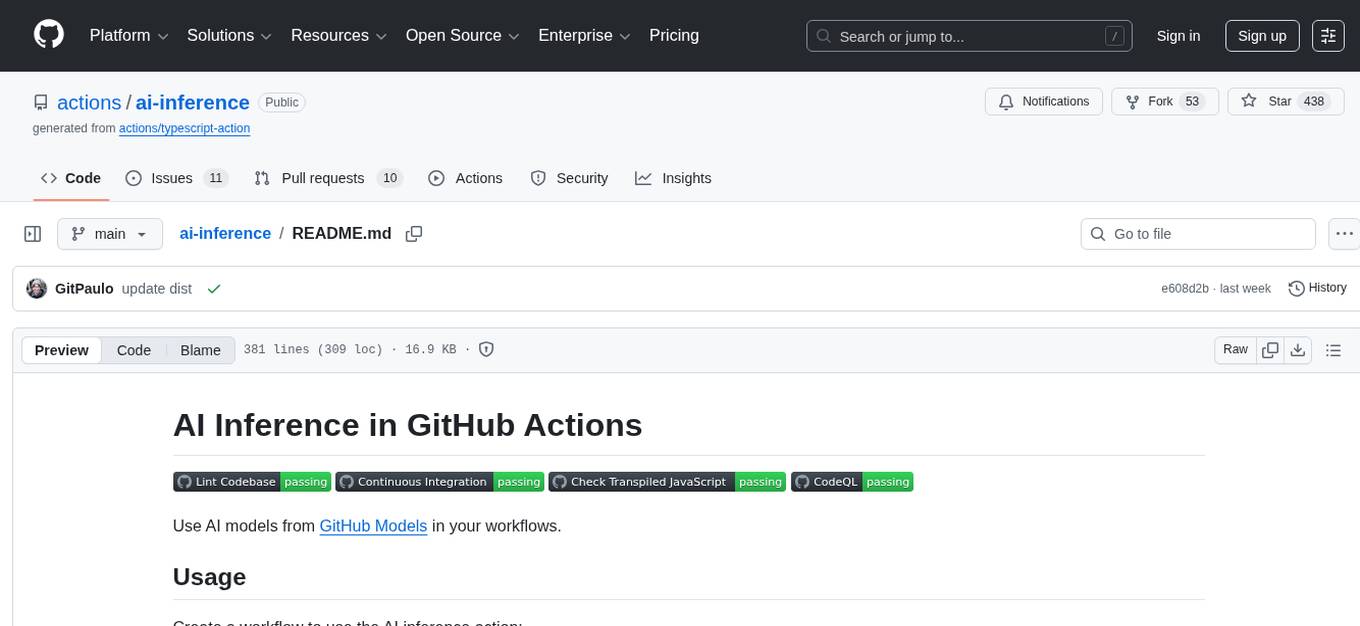
ai-inference
AI Inference is a Python library that provides tools for deploying and running machine learning models in production environments. It simplifies the process of integrating AI models into applications by offering a high-level API for inference tasks. With AI Inference, developers can easily load pre-trained models, perform inference on new data, and deploy models as RESTful APIs. The library supports various deep learning frameworks such as TensorFlow and PyTorch, making it versatile for a wide range of AI applications.
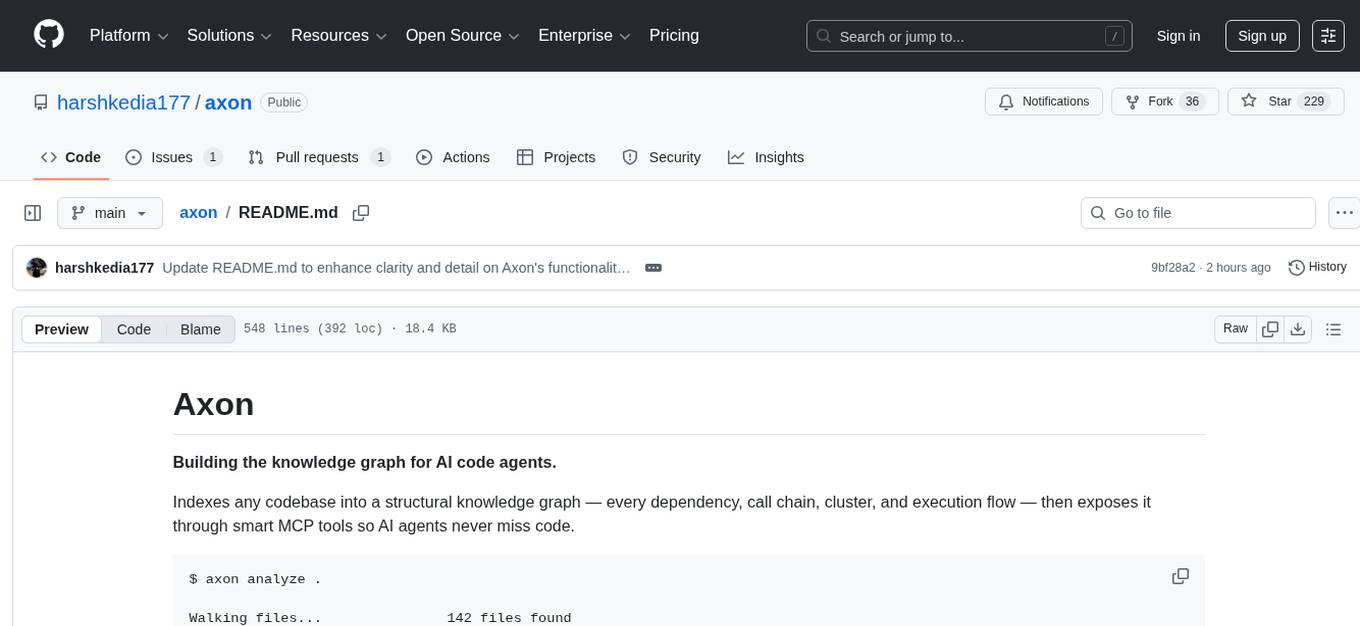
axon
Axon is a powerful neural network library for Python that provides a simple and flexible way to build, train, and deploy deep learning models. It offers a wide range of neural network architectures, optimization algorithms, and evaluation metrics to support various machine learning tasks. With Axon, users can easily create complex neural networks, train them on large datasets, and deploy them in production environments. The library is designed to be user-friendly and efficient, making it suitable for both beginners and experienced deep learning practitioners.
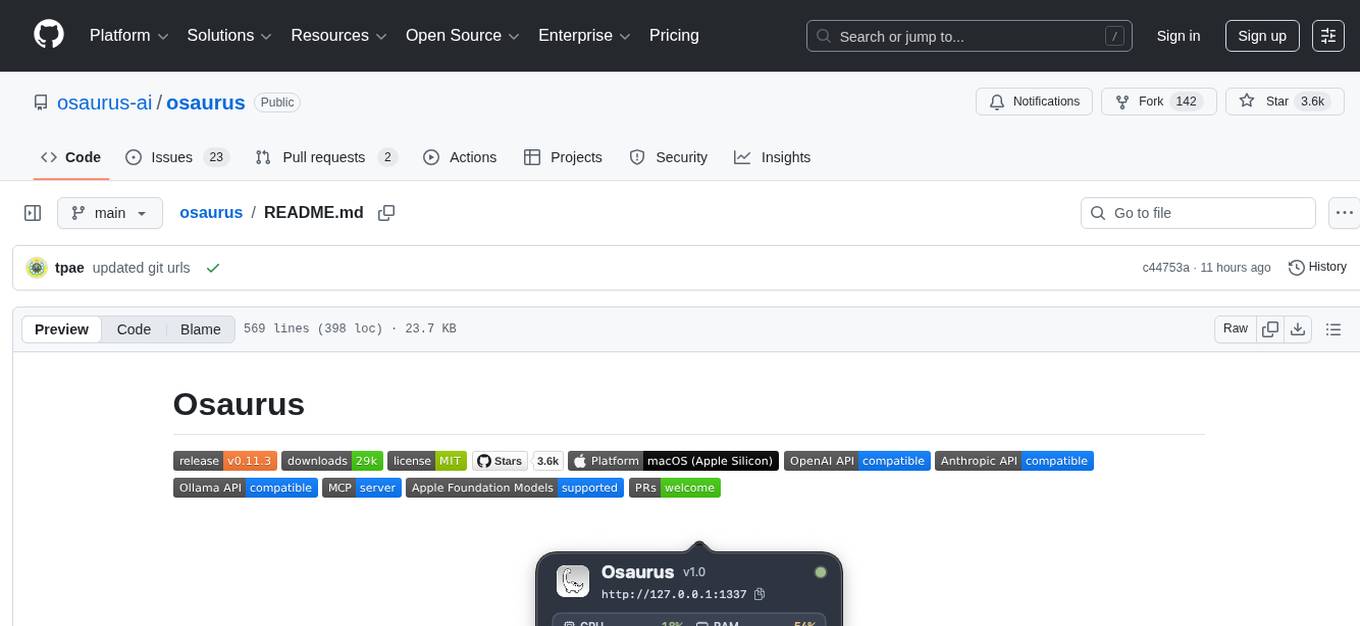
osaurus
Osaurus is a versatile open-source tool designed for data scientists and machine learning engineers. It provides a wide range of functionalities for data preprocessing, feature engineering, model training, and evaluation. With Osaurus, users can easily clean and transform raw data, extract relevant features, build and tune machine learning models, and analyze model performance. The tool supports various machine learning algorithms and techniques, making it suitable for both beginners and experienced practitioners in the field. Osaurus is actively maintained and updated to incorporate the latest advancements in the machine learning domain, ensuring users have access to state-of-the-art tools and methodologies for their projects.
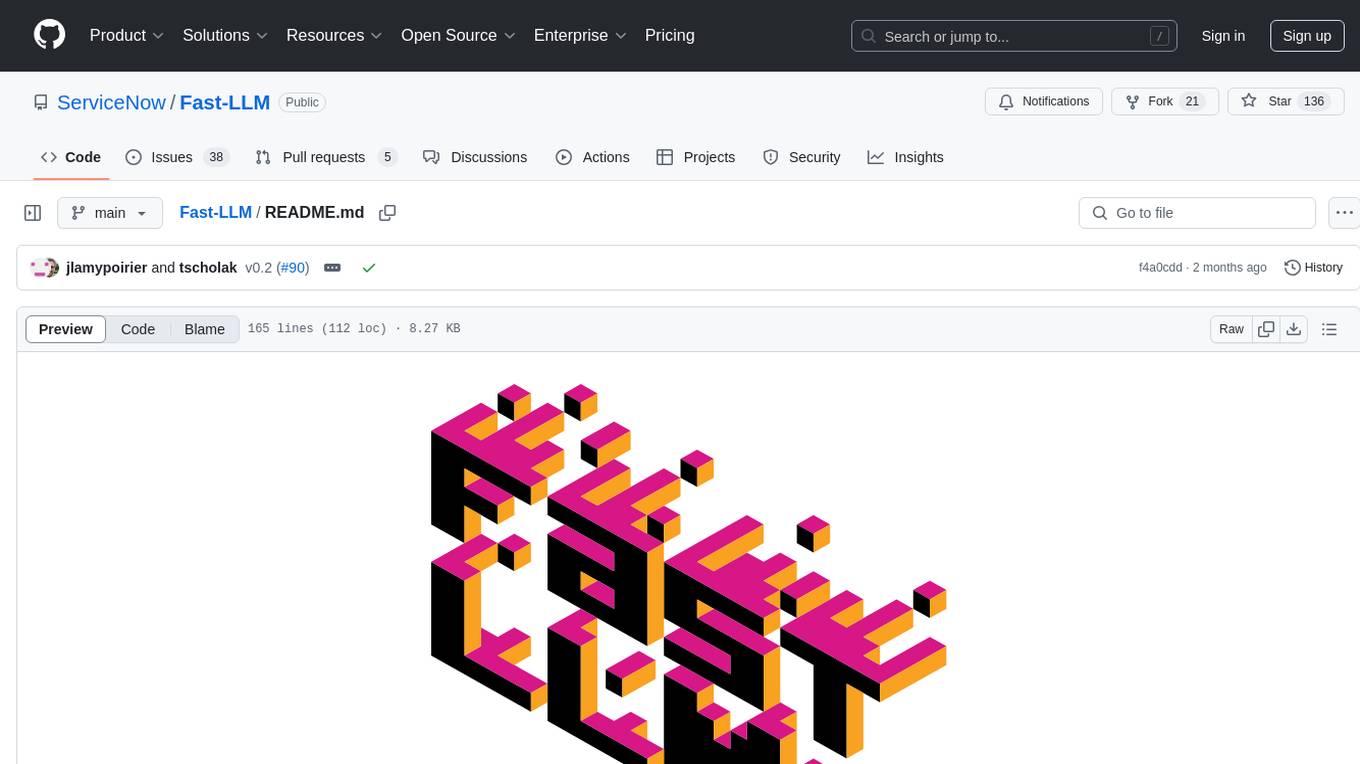
Fast-LLM
Fast-LLM is an open-source library designed for training large language models with exceptional speed, scalability, and flexibility. Built on PyTorch and Triton, it offers optimized kernel efficiency, reduced overheads, and memory usage, making it suitable for training models of all sizes. The library supports distributed training across multiple GPUs and nodes, offers flexibility in model architectures, and is easy to use with pre-built Docker images and simple configuration. Fast-LLM is licensed under Apache 2.0, developed transparently on GitHub, and encourages contributions and collaboration from the community.
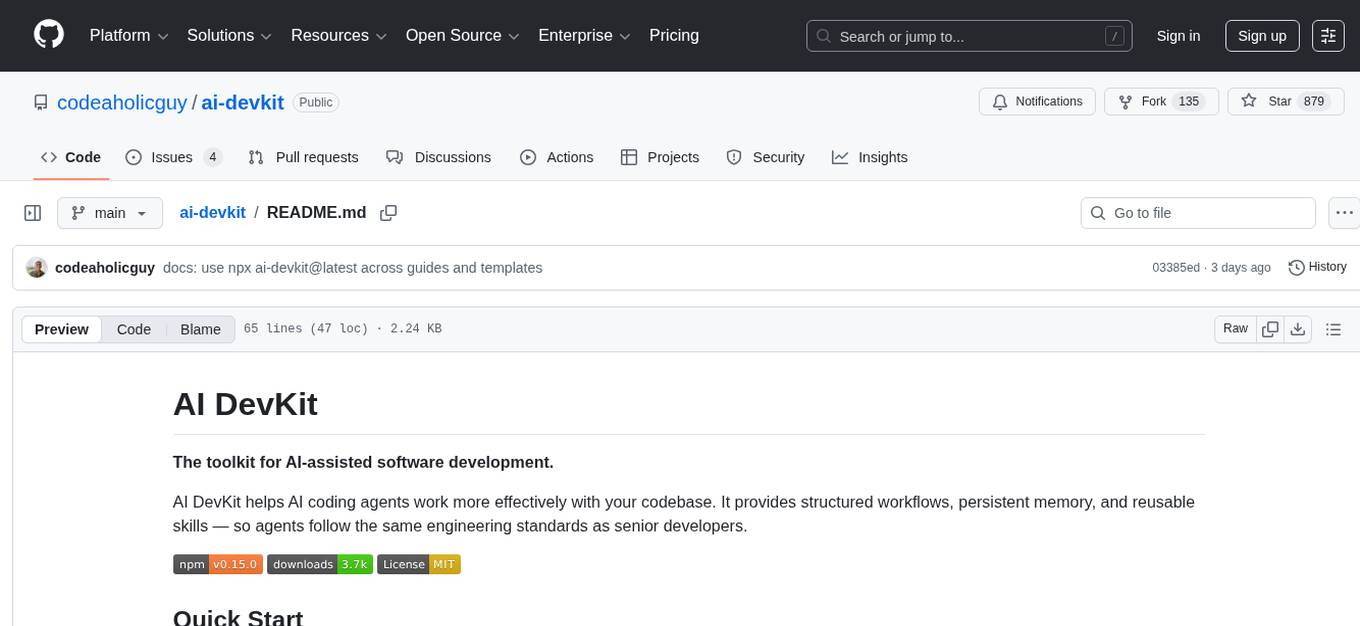
ai-devkit
The ai-devkit repository is a comprehensive toolkit for developing and deploying artificial intelligence models. It provides a wide range of tools and resources to streamline the AI development process, including pre-trained models, data processing utilities, and deployment scripts. With a focus on simplicity and efficiency, ai-devkit aims to empower developers to quickly build and deploy AI solutions across various domains and applications.

open-ai
Open AI is a powerful tool for artificial intelligence research and development. It provides a wide range of machine learning models and algorithms, making it easier for developers to create innovative AI applications. With Open AI, users can explore cutting-edge technologies such as natural language processing, computer vision, and reinforcement learning. The platform offers a user-friendly interface and comprehensive documentation to support users in building and deploying AI solutions. Whether you are a beginner or an experienced AI practitioner, Open AI offers the tools and resources you need to accelerate your AI projects and stay ahead in the rapidly evolving field of artificial intelligence.
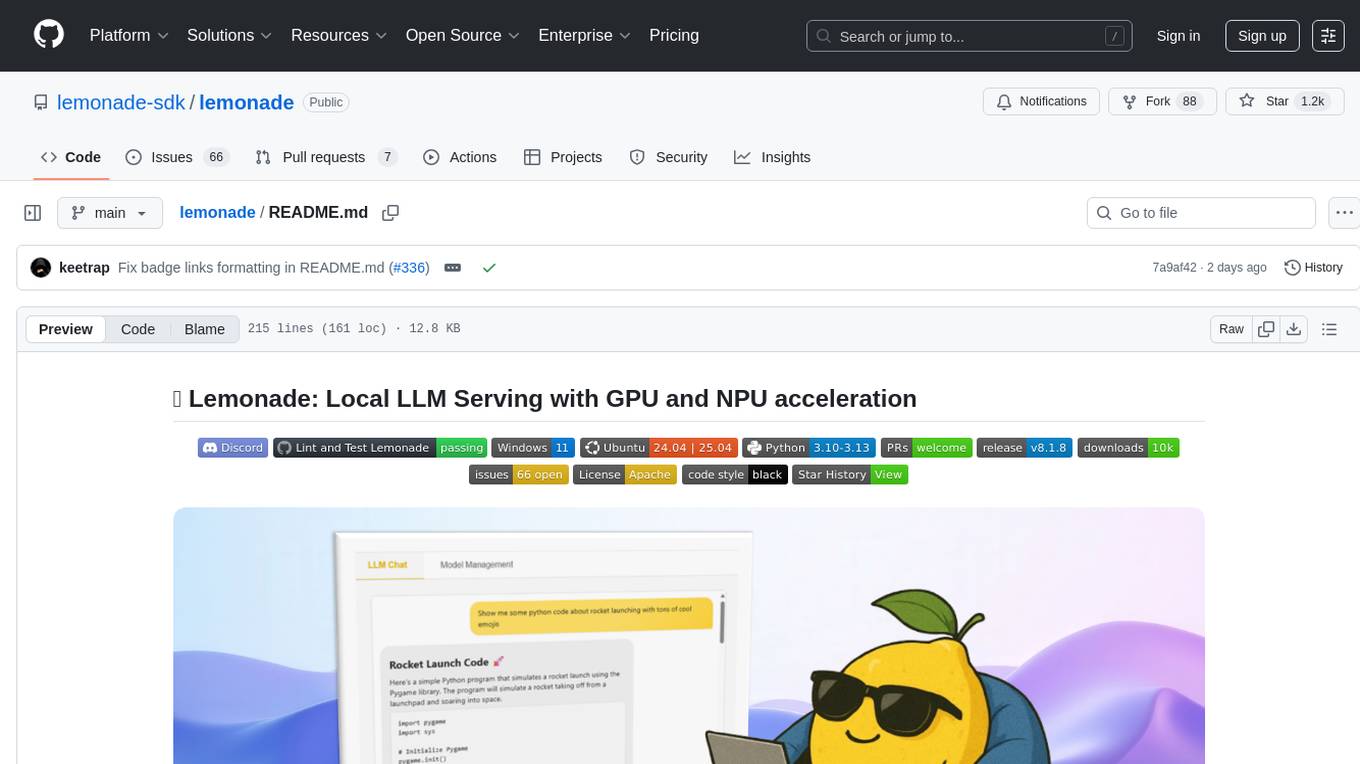
lemonade
Lemonade is a tool that helps users run local Large Language Models (LLMs) with high performance by configuring state-of-the-art inference engines for their Neural Processing Units (NPUs) and Graphics Processing Units (GPUs). It is used by startups, research teams, and large companies to run LLMs efficiently. Lemonade provides a high-level Python API for direct integration of LLMs into Python applications and a CLI for mixing and matching LLMs with various features like prompting templates, accuracy testing, performance benchmarking, and memory profiling. The tool supports both GGUF and ONNX models and allows importing custom models from Hugging Face using the Model Manager. Lemonade is designed to be easy to use and switch between different configurations at runtime, making it a versatile tool for running LLMs locally.
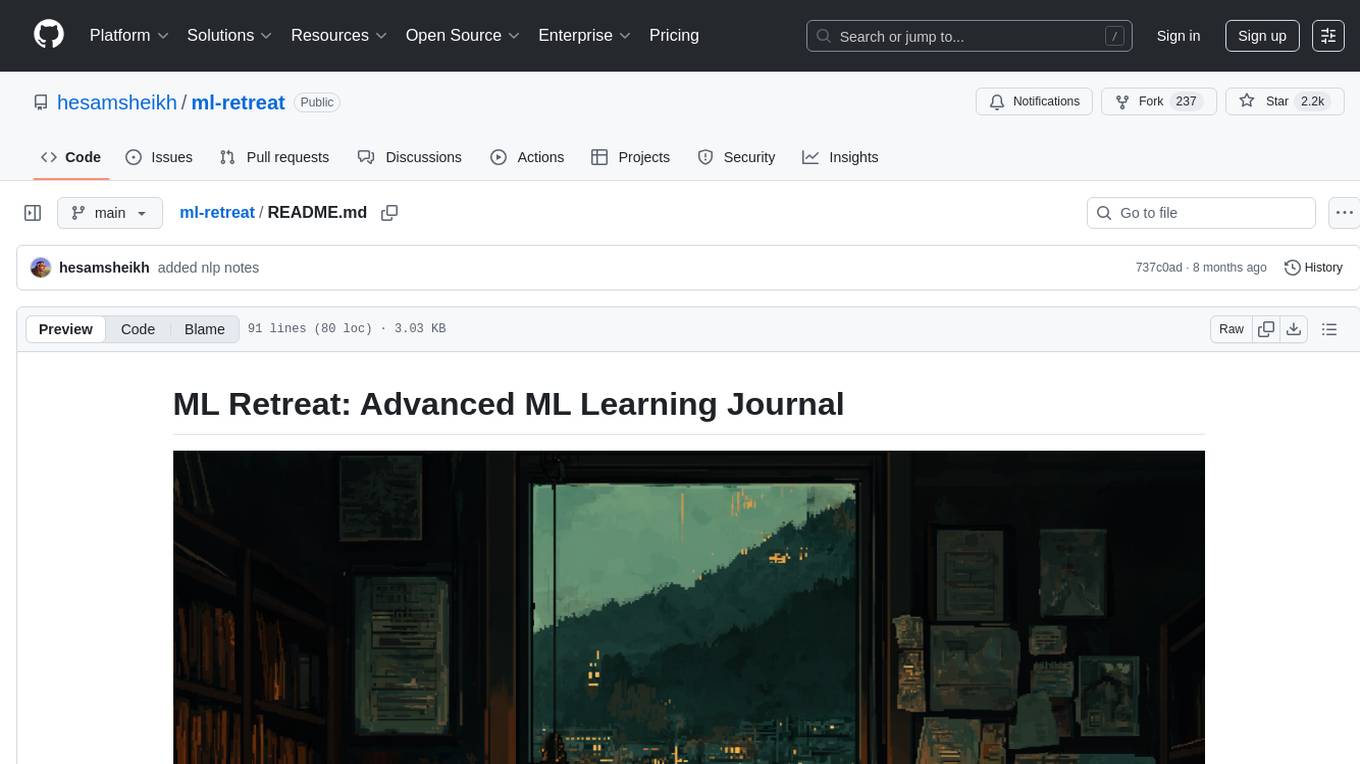
ml-retreat
ML-Retreat is a comprehensive machine learning library designed to simplify and streamline the process of building and deploying machine learning models. It provides a wide range of tools and utilities for data preprocessing, model training, evaluation, and deployment. With ML-Retreat, users can easily experiment with different algorithms, hyperparameters, and feature engineering techniques to optimize their models. The library is built with a focus on scalability, performance, and ease of use, making it suitable for both beginners and experienced machine learning practitioners.
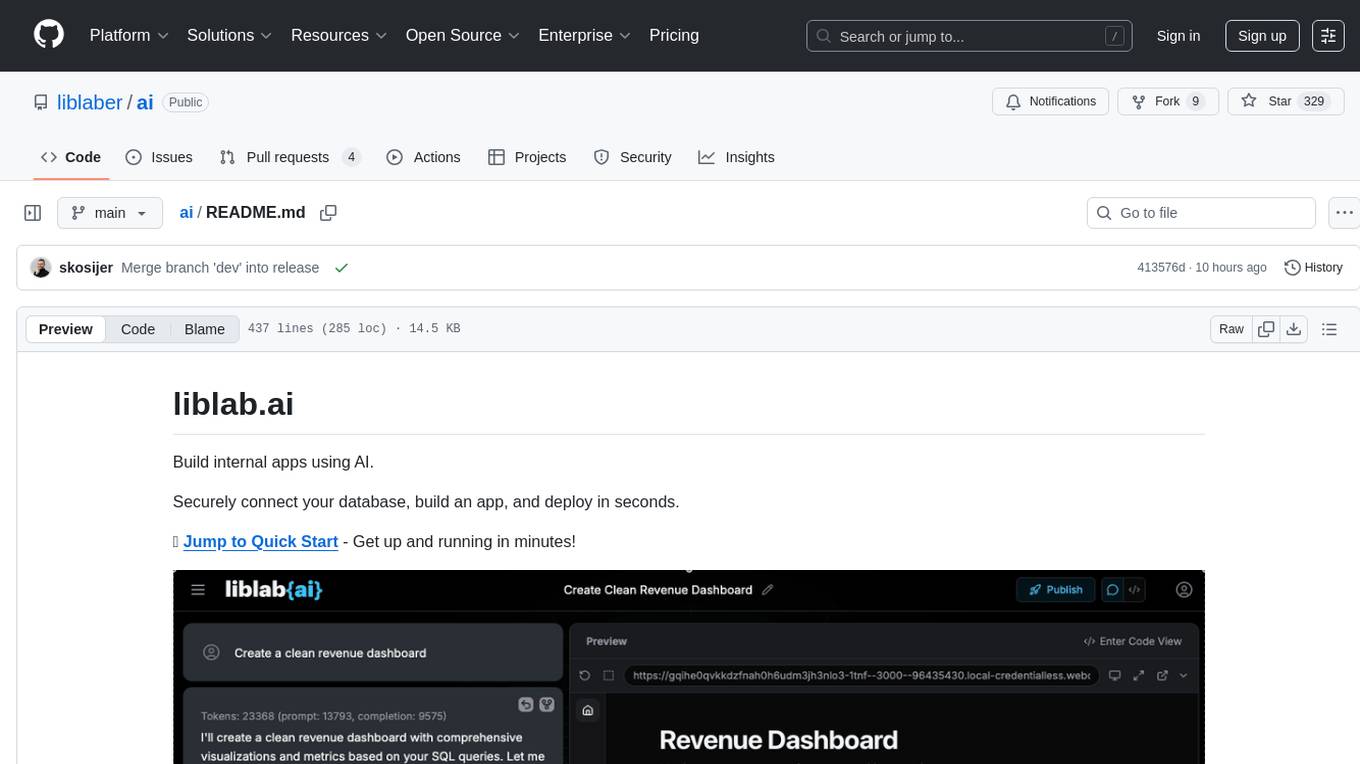
ai
This repository contains a collection of AI algorithms and models for various machine learning tasks. It provides implementations of popular algorithms such as neural networks, decision trees, and support vector machines. The code is well-documented and easy to understand, making it suitable for both beginners and experienced developers. The repository also includes example datasets and tutorials to help users get started with building and training AI models. Whether you are a student learning about AI or a professional working on machine learning projects, this repository can be a valuable resource for your development journey.
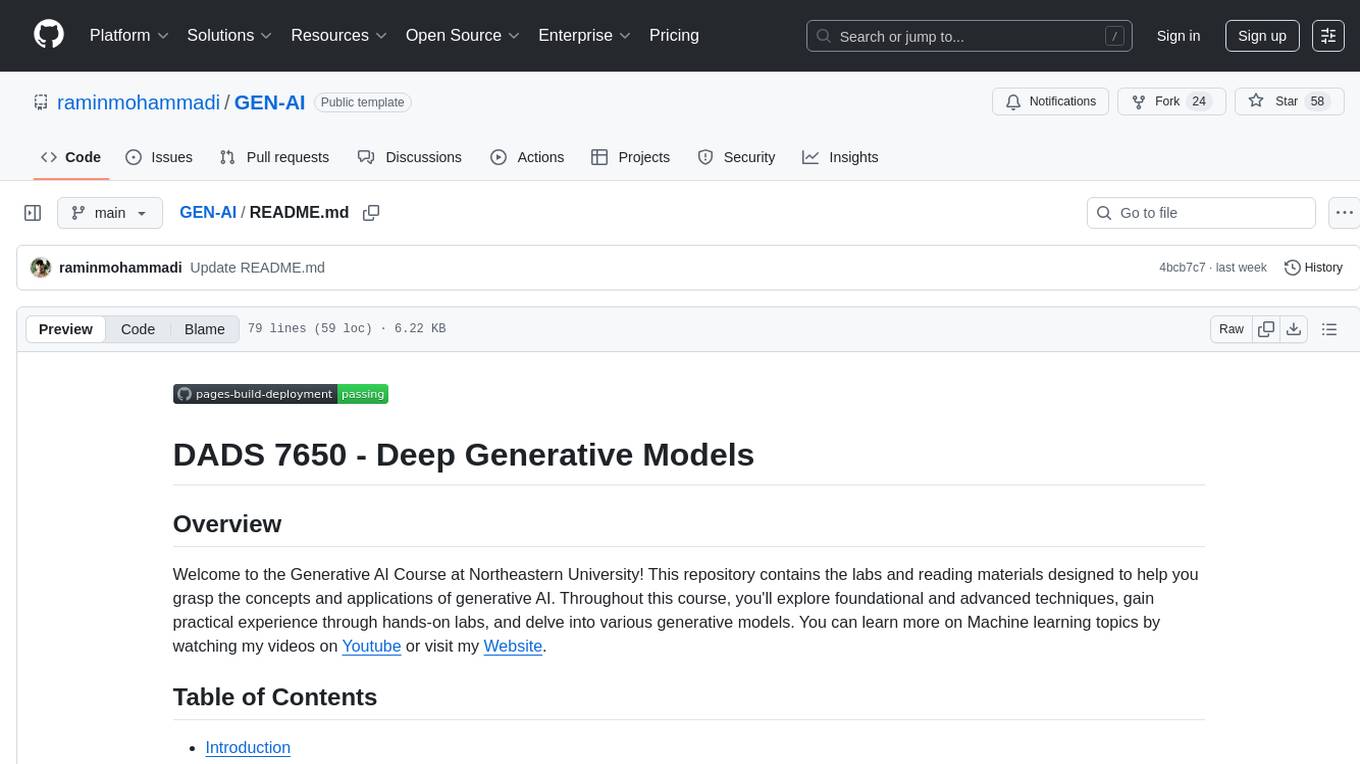
GEN-AI
GEN-AI is a versatile Python library for implementing various artificial intelligence algorithms and models. It provides a wide range of tools and functionalities to support machine learning, deep learning, natural language processing, computer vision, and reinforcement learning tasks. With GEN-AI, users can easily build, train, and deploy AI models for diverse applications such as image recognition, text classification, sentiment analysis, object detection, and game playing. The library is designed to be user-friendly, efficient, and scalable, making it suitable for both beginners and experienced AI practitioners.
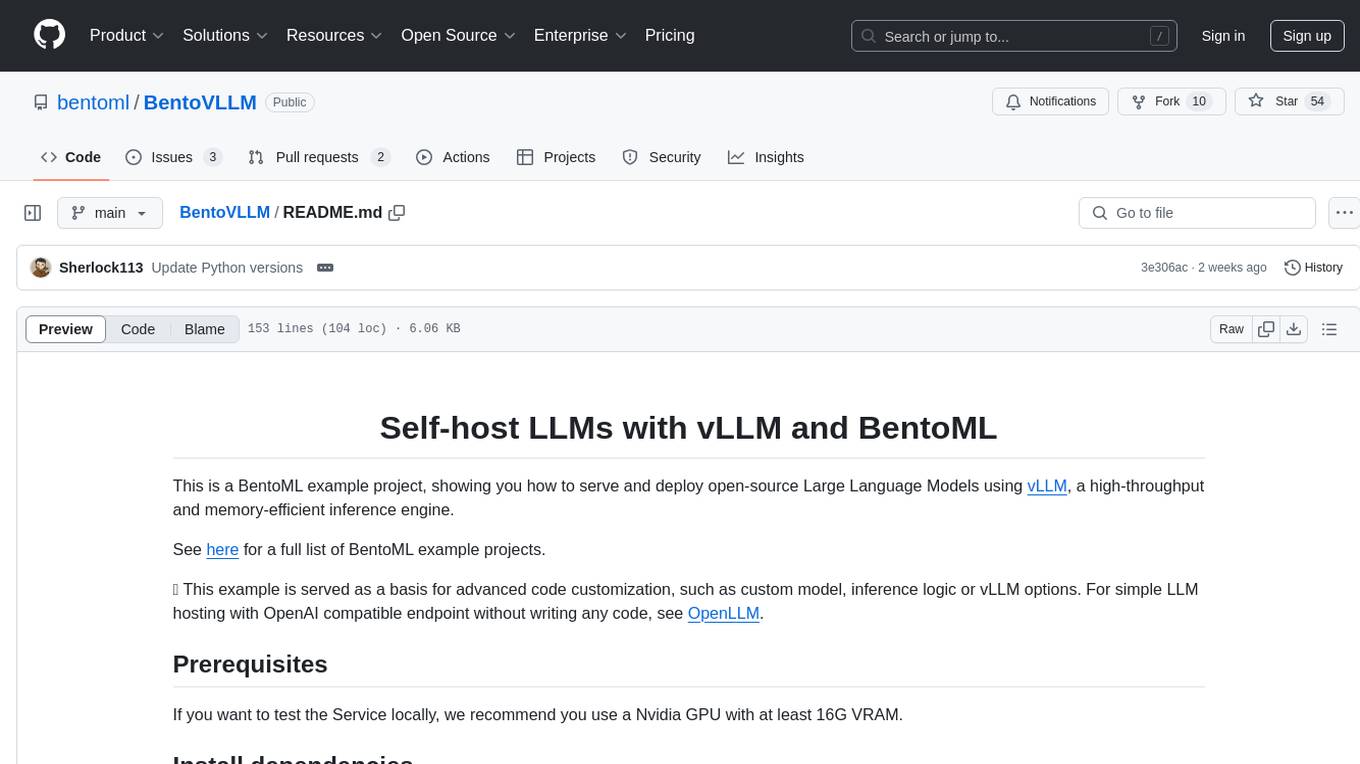
BentoVLLM
BentoVLLM is an example project demonstrating how to serve and deploy open-source Large Language Models using vLLM, a high-throughput and memory-efficient inference engine. It provides a basis for advanced code customization, such as custom models, inference logic, or vLLM options. The project allows for simple LLM hosting with OpenAI compatible endpoints without the need to write any code. Users can interact with the server using Swagger UI or other methods, and the service can be deployed to BentoCloud for better management and scalability. Additionally, the repository includes integration examples for different LLM models and tools.
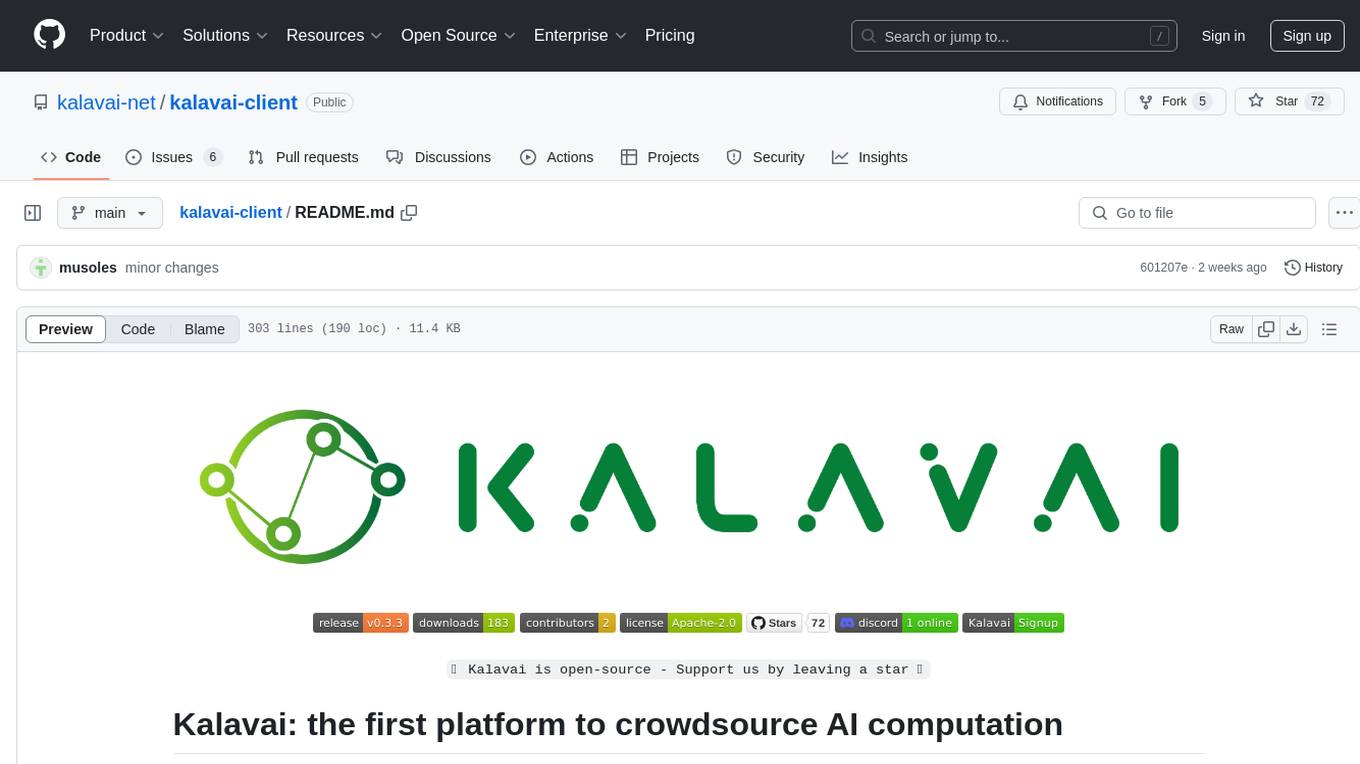
kalavai-client
Kalavai is an open-source platform that transforms everyday devices into an AI supercomputer by aggregating resources from multiple machines. It facilitates matchmaking of resources for large AI projects, making AI hardware accessible and affordable. Users can create local and public pools, connect with the community's resources, and share computing power. The platform aims to be a management layer for research groups and organizations, enabling users to unlock the power of existing hardware without needing a devops team. Kalavai CLI tool helps manage both versions of the platform.
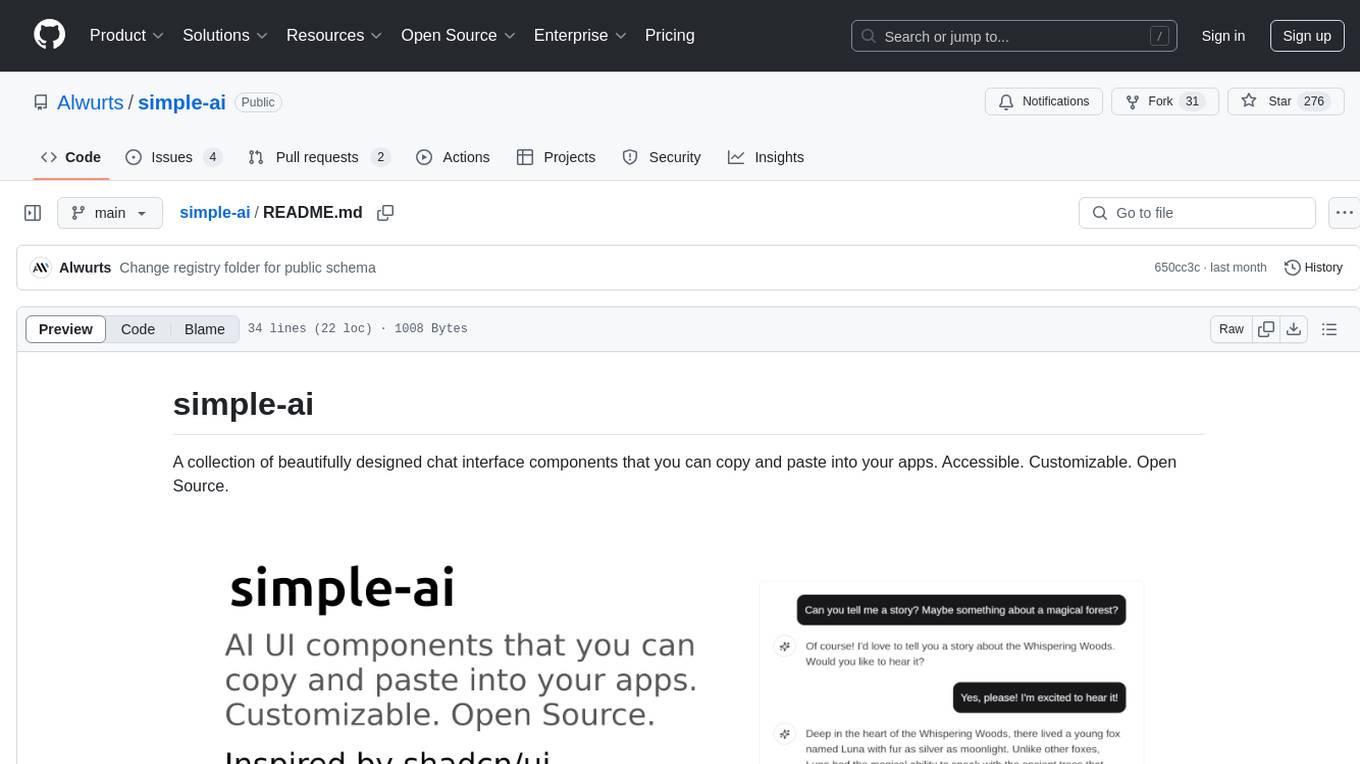
simple-ai
Simple AI is a lightweight Python library for implementing basic artificial intelligence algorithms. It provides easy-to-use functions and classes for tasks such as machine learning, natural language processing, and computer vision. With Simple AI, users can quickly prototype and deploy AI solutions without the complexity of larger frameworks.
For similar tasks

ai-on-gke
This repository contains assets related to AI/ML workloads on Google Kubernetes Engine (GKE). Run optimized AI/ML workloads with Google Kubernetes Engine (GKE) platform orchestration capabilities. A robust AI/ML platform considers the following layers: Infrastructure orchestration that support GPUs and TPUs for training and serving workloads at scale Flexible integration with distributed computing and data processing frameworks Support for multiple teams on the same infrastructure to maximize utilization of resources

ray
Ray is a unified framework for scaling AI and Python applications. It consists of a core distributed runtime and a set of AI libraries for simplifying ML compute, including Data, Train, Tune, RLlib, and Serve. Ray runs on any machine, cluster, cloud provider, and Kubernetes, and features a growing ecosystem of community integrations. With Ray, you can seamlessly scale the same code from a laptop to a cluster, making it easy to meet the compute-intensive demands of modern ML workloads.

labelbox-python
Labelbox is a data-centric AI platform for enterprises to develop, optimize, and use AI to solve problems and power new products and services. Enterprises use Labelbox to curate data, generate high-quality human feedback data for computer vision and LLMs, evaluate model performance, and automate tasks by combining AI and human-centric workflows. The academic & research community uses Labelbox for cutting-edge AI research.

djl
Deep Java Library (DJL) is an open-source, high-level, engine-agnostic Java framework for deep learning. It is designed to be easy to get started with and simple to use for Java developers. DJL provides a native Java development experience and allows users to integrate machine learning and deep learning models with their Java applications. The framework is deep learning engine agnostic, enabling users to switch engines at any point for optimal performance. DJL's ergonomic API interface guides users with best practices to accomplish deep learning tasks, such as running inference and training neural networks.

mlflow
MLflow is a platform to streamline machine learning development, including tracking experiments, packaging code into reproducible runs, and sharing and deploying models. MLflow offers a set of lightweight APIs that can be used with any existing machine learning application or library (TensorFlow, PyTorch, XGBoost, etc), wherever you currently run ML code (e.g. in notebooks, standalone applications or the cloud). MLflow's current components are:
* `MLflow Tracking

tt-metal
TT-NN is a python & C++ Neural Network OP library. It provides a low-level programming model, TT-Metalium, enabling kernel development for Tenstorrent hardware.

burn
Burn is a new comprehensive dynamic Deep Learning Framework built using Rust with extreme flexibility, compute efficiency and portability as its primary goals.

awsome-distributed-training
This repository contains reference architectures and test cases for distributed model training with Amazon SageMaker Hyperpod, AWS ParallelCluster, AWS Batch, and Amazon EKS. The test cases cover different types and sizes of models as well as different frameworks and parallel optimizations (Pytorch DDP/FSDP, MegatronLM, NemoMegatron...).
For similar jobs

weave
Weave is a toolkit for developing Generative AI applications, built by Weights & Biases. With Weave, you can log and debug language model inputs, outputs, and traces; build rigorous, apples-to-apples evaluations for language model use cases; and organize all the information generated across the LLM workflow, from experimentation to evaluations to production. Weave aims to bring rigor, best-practices, and composability to the inherently experimental process of developing Generative AI software, without introducing cognitive overhead.

agentcloud
AgentCloud is an open-source platform that enables companies to build and deploy private LLM chat apps, empowering teams to securely interact with their data. It comprises three main components: Agent Backend, Webapp, and Vector Proxy. To run this project locally, clone the repository, install Docker, and start the services. The project is licensed under the GNU Affero General Public License, version 3 only. Contributions and feedback are welcome from the community.

oss-fuzz-gen
This framework generates fuzz targets for real-world `C`/`C++` projects with various Large Language Models (LLM) and benchmarks them via the `OSS-Fuzz` platform. It manages to successfully leverage LLMs to generate valid fuzz targets (which generate non-zero coverage increase) for 160 C/C++ projects. The maximum line coverage increase is 29% from the existing human-written targets.

LLMStack
LLMStack is a no-code platform for building generative AI agents, workflows, and chatbots. It allows users to connect their own data, internal tools, and GPT-powered models without any coding experience. LLMStack can be deployed to the cloud or on-premise and can be accessed via HTTP API or triggered from Slack or Discord.

VisionCraft
The VisionCraft API is a free API for using over 100 different AI models. From images to sound.

kaito
Kaito is an operator that automates the AI/ML inference model deployment in a Kubernetes cluster. It manages large model files using container images, avoids tuning deployment parameters to fit GPU hardware by providing preset configurations, auto-provisions GPU nodes based on model requirements, and hosts large model images in the public Microsoft Container Registry (MCR) if the license allows. Using Kaito, the workflow of onboarding large AI inference models in Kubernetes is largely simplified.

PyRIT
PyRIT is an open access automation framework designed to empower security professionals and ML engineers to red team foundation models and their applications. It automates AI Red Teaming tasks to allow operators to focus on more complicated and time-consuming tasks and can also identify security harms such as misuse (e.g., malware generation, jailbreaking), and privacy harms (e.g., identity theft). The goal is to allow researchers to have a baseline of how well their model and entire inference pipeline is doing against different harm categories and to be able to compare that baseline to future iterations of their model. This allows them to have empirical data on how well their model is doing today, and detect any degradation of performance based on future improvements.

Azure-Analytics-and-AI-Engagement
The Azure-Analytics-and-AI-Engagement repository provides packaged Industry Scenario DREAM Demos with ARM templates (Containing a demo web application, Power BI reports, Synapse resources, AML Notebooks etc.) that can be deployed in a customer’s subscription using the CAPE tool within a matter of few hours. Partners can also deploy DREAM Demos in their own subscriptions using DPoC.